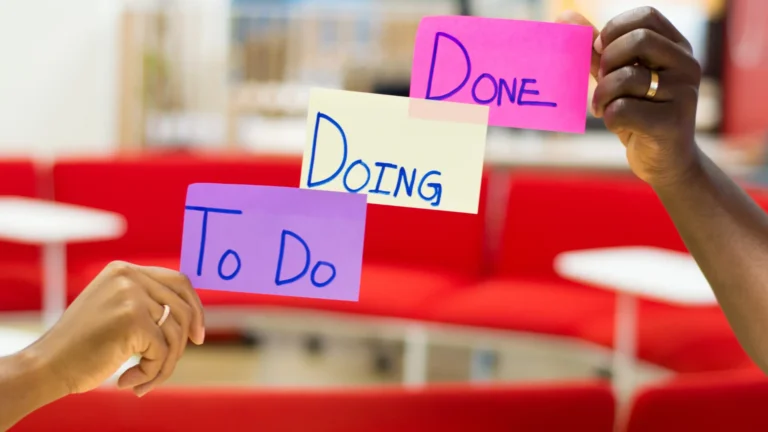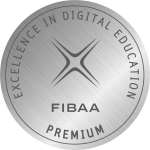The good news is: you cleared the first hurdle of the application and were invited to an interview. As soon as the first hurdle has been overcome and the invitation for an interview has been received, the excitement increases and the targeted preparations for a conversation that is as successful as possible can begin.
Interviews are a big challenge on the way to a dream job and are feared. You have to be convincing in a personal conversation.
“What does the HR manager want to know from me?” Every applicant asks himself nervously before a classic job interview, which is a question-and-answer game. The recruiter asks and you, the applicant, answer. He would like to find out whether you are suitable for the position and whether you also fit into the company. But the applicant could also ask questions to find out whether the position and corporate culture suits him or her.
The recruiter wants to learn as much as possible about your personality, character, motivation, strengths and weaknesses. Such job interviews are usually relatively similar and certain questions keep coming up.
But how can the applicant prepare for the most frequently asked questions and score points with clever queries, and what are the no-go questions that an applicant should rather avoid? We have collected five tricky questions for you:
5 typical job interview questions
1) Where do you see yourself in 5 years?
A question that causes headaches for many applicants. But if you know what’s behind this question, it’s easier to answer. The HR manager would like to find out more about your personal career plan and find out whether you plan to stay in their company in the long term. So what are your goals? Do you fit the company? Do you want to make a long-term commitment?
It is best to make clear statements about your goals, which also coincide with the ideas of the employer. Express in particular that you are flexible and also open to interesting and responsible activities. Show that they can further develop your skills.
2) What are your strengths and weaknesses?
You don’t always ask about your strengths directly, sometimes it also means “What are you particularly good at?”, “Which tasks at your current job do you particularly like?”, or “How does your boss see you?”.
Make sure that you remain authentic. When it comes to strengths, answer confidently but not too effusively. It is best to compare your personal strengths with the requirement profile of the position in advance and give specific examples. For example, problem-solving skills and the ability to learn are popular with HR professionals.
However, it is usually difficult with the weaknesses. But these are human and the question is rather how you deal with them. Name a personal weakness, but also signal your willingness to learn and to eliminate this weakness. This shows the ability to reflect and the willingness to learn.
3) Have you ever faced a task that you couldn’t solve right away? How did you react?
Or: How did you deal with a difficult situation? How do you deal with problems?
Here the HR manager tests how you deal with problems and stress and how you behave in hopeless situations. Think of an example and explain how you analyzed and recognized the problem. How did you manage to solve the problem anyway? Did you get help or did you look for similar problems and transfer their solutions to the new situation?
4) Have you ever experienced that the work in the team did not go as desired? How did you behave?
The ability to work in a team is an important social skill in modern companies. But there are tensions in almost every team. Show that you can solve problems openly and constructively together with other team members. For example, a good response would be: “We addressed the issues openly in a team meeting. During the conversation it turned out that some colleagues were overworked. We then redistributed the tasks and were able to relieve our colleagues together.”
5) Why should we hire you?
HR professionals like to use this question to put you under pressure, i.e. to test your behavior under stress.
Keep calm and briefly summarize your strengths again. Convince yourself with a short self-presentation of your professional experience, your successes and special achievements. Above all, show how the company can benefit from your skills. You should always keep an eye on the requirements from the job advertisement. Combine your strengths with the qualifications required in the job advertisement.
30 more frequently asked questions in job interviews
- Why did you apply to us?
- What do you know about our company?
- Describe your previous tasks!
- What distinguishes you from other applicants?
- How do you deal with stress?
- How do you react to criticism?
- How do you deal with criticism?
- Why did you quit?
- Why do you want to switch?
- Why do you want to leave your current employer?
- Why are you looking for a new job?
- What do you want to earn?
- According to your former boss, what are three things you could improve on?
- Are you ready to travel?
- What’s your dream job?
- Tell me about a mistake you made.
- Are you willing to relocate?
- Are you willing to work holidays/weekends?
- Who are our competitors?
- What would your team members/boss say about you?
- What are your hobbies?
- What skills do you bring to the advertised job?
- Would you work more than 40 hours a week?
- How do you explain this gap in your CV?
- What is your salary expectation?
- How would you describe your working style?
- What are your goals with this job?
- If you were an animal, what would it be?
- What distinguishes you from other applicants?
- What skills do you have that others don’t have?
Clever questions of your own – exceed the basic requirements
In addition to the basic requirements such as punctuality, an appropriate outfit, good behavior, motivation, interest and open-mindedness, an applicant can shine through their own good queries. They are the icing on the cake and they show that the applicant has prepared well.
It shows that there is interest in the company and through well-prepared questions, candidates make a competent impression on HR.
Do you have anymore questions? What smart questions should you ask in an interview?
The job offers often offer starting points for meaningful questions. Another starting point is to be as clear as possible beforehand about how I would actually like to work. This applies, among other things, to the leadership principles of the superiors, the equipment in the workplace, the working atmosphere among colleagues, the area of responsibility and the scope of tasks, etc. From this, you can wonderfully derive your own questions for the job interview.
In the following we show 24 examples of queries:
- Why is this position advertised?
- How would you describe your corporate culture?
- How would you describe the management style of your immediate superior?
- What challenges are you currently facing?
- Where am I deployed? ask
- Do you still have time to take a look at the workplace?
- Who will I report to? And possibly: who will tell me?
- How long did my predecessor stay in this position?
- What do you like most about working here?
- What are the top three expectations of someone in this position?
- What are the most important skills someone needs to have to be successful within the company?
- What typical mistakes can I avoid that others in this position made at the beginning? application
- How has the job description for this position evolved in recent years? Career
- What training opportunities do you offer new employees? Career
- Has anyone on the team been promoted in recent years? If yes, why was this person promoted?
- Do you still have doubts about my suitability for this position that we should talk about?
- How does the application process continue?
- What does the usual training look like?
- What can I expect in the first 90 days?
- Is there a rough schedule for the hiring decision?
- What’s next after the conversation?
- If there is a second interview, who would sit across from me?
- Why do you work for this ?
- How is your working time recorded?
What should you avoid in a job interview?
The interview is often the last hurdle before the dream job. Applicants now expect typical questions in the job interview: Questions about working methods, your soft skills, personality, strengths and weaknesses. Job interview, even stress questions and trick questions. We provide you with 10 typical categories with more than 100 studies
The applicant should pay attention to his public image from beginning to end. To the receptionist, to the employees who come by and also on the way home. Floating phrases on the phone about the conversation like “Yes, it was quite good. But one was kind of totally weird.” You should save yourself during the interview until you are out of earshot. Other questions that you should better not ask in an interview as feedback from the job interview are listed here:
Inappropriate questions and taboo topics in job interviews
- How many employees does the company have?
- Does it also have branches abroad?
- What exactly does your company do?
- Do I have good chances of advancement?
- Is my future boss nice?
- What are you paying me?
- Will I get a raise soon?
- How many vacation days do I have?
- Can I come earlier and then finish work earlier?
- Is it allowed to use Facebook at work?
- How do you handle sick leave?
In general, questions about working hours, vacation or the employer, private preparations, use of the Internet are not very appropriate for applications. The above questions make the applicant appear naïve and clueless towards the employer, since the answers will answer themselves when preparing for the application. You should also avoid asking questions that have already been answered in the course of the conversation. It is therefore advisable to write down a few questions and to take notes during the interview and tick off which questions have already been answered.
Stay authentic
Not every question fits every applicant, so choose the right ones and stay true to yourself. Better not to overdo it, always tell the truth. Fantastic knowledge in certain areas can sooner or later be tested and at the latest then you will have to make up for it, although you will most likely not have the time to do so. This could get very uncomfortable. But after reading this article, that won’t happen to you.
Job interview – Questions: What else can I expect?
As already mentioned, the purpose of the interview is for both – employer and employee – to get to know each other better. Accordingly, HR managers ask many questions: Why should we hire you? What makes you different from others? How do you motivate yourself? How many piano tuners does Chicago have? – Behind this are different question types and questioning techniques.
Such interview questions are not meant to be malicious. It is almost always about finding out more about the applicants and their personality. You can remember the following rules of thumb in advance:
- What answers at the interview?
- What not to ask in an interview?
- What questions can I ask at the interview?
- How many questions to ask at an interview?
- How to be authentic in an interview?
More typical job interview questions and answers
Below is a list of additional interview questions. We have sorted them by question types and intentions. So you know immediately what the interview question is about. There are tips for the best answer.
1. Conversation opener
Typical question: “Why do you want this job?”
After the first small talk , the phase of getting to know each other begins. If you give applicants priority, the self-presentation now follows. You should summarize the most important information about yourself in 3-5 minutes. The structure based on the pattern “I am… I can… I want…” has proven itself.
The last part is important . Here you show how you want to use your knowledge and skills in the job and thus create added value. According to research by Ayelet Fishbach from the Booth School of Business, recruiters are less impressed by ambition than by applicants who explain why they love the job.
More conversation opener questions
- What can you tell about yourself?
- Why should we hire you?
- What makes you different from others?
- What can you do for us that others cannot?
- What do you know about our company?
- What does your dream job look like?
2. Questions about application motivation
Typical question: “What are your goals with this job?”
Companies are looking for committed employees. But there is another question behind the question: “Why did you (of all places) apply to us?” HR professionals are looking for talented people who are passionate about the job and the position and want to remain part of the company in the long term. Accordingly, they convince with their motivation when answering these questions.
Be sure to support them with body language and facial expressions. The more credibly you answer the question, the better your chances of applying.
Further questions on application motivation
- What 3 positive things would your ex boss say about you?
- And what would he say negatively about you?
- What is your biggest mistake – what have you learned from it?
- What 3 positive character traits are you missing?
- What are you most afraid of?
- When did you underperform and what?
- What do you regret most? Why?
- What irritates you about people – how do you deal with that?
- What should I definitely know about you?
4. Questions about the working method
Typical question: “How would you describe your working style?”
Everyone works differently. It still has to fit in the team. You earn plus points with these questions by describing your way of working according to the position: Is teamwork a top priority?
Then describe yourself as cooperative. Are clear instructions and responsibilities required? Then go into it. But don’t promise too much. If your way of working cannot keep up, it will be noticed negatively during the probationary period.
More interview questions
- What was the last project you worked on?
- What was the result of this project?
- How do you deal with change?
- How do you organize yourself?
- How do you motivate yourself?
- What is your idea of hard work?
- What were you responsible for in your old job?
- What do you do when you find it impossible to complete the daily tasks?
- How do you demonstrate your trustworthiness in the new team?
- How do you feel when you get “no” for an answer?
- When and how was the last time you criticized a colleague?
- How do you react when someone rests on someone else’s work?
- Which task was too difficult for you – and how did you solve the problem?
- What will you do in the first 90 days of this job?
5. Questions about fitting and chemistry
Typical question: “What attracted you to this company?”
You as a person must also fit the employer. Such “cultural questions” are about shared values. Do your values match the corporate culture? Be sure to answer with similarities: Is the employer future-oriented like you? Is it about the sustainable use of resources? Or are you just as enthusiastic about research and development as about the company’s latest innovations? Ideally, research that beforehand to justify your answer.
More interview questions
- What is the ideal company for you?
- What would be an ideal working situation for you?
- When were you most satisfied in your job?
- Which culture appeals to you more – structured or entrepreneurial?
- What applies more to you: you are detail-oriented – you are visionary?
- Which is better: Should a boss be loved or feared?
- What are the key characteristics of a good leader?
- And a bad one?
- What is the difference between good and extraordinary?
- What conflicts have you experienced in your previous jobs?
6. Questions about character
Typical question: “Name 5 terms that describe your character!”
Another form of value testing. They should describe themselves and reveal a lot about themselves just by the selection. Self-confidence is important, but exaggerated self-praise is unsympathetic.
Relevant strengths (for the job) and a few likeable weaknesses (ratio: 3:2) are convincing here. Show “clear edge” and that you are a character head.
More character interview
- What 3 personality traits would friends say you had?
- What are you particularly proud of?
- What was the most important life lesson you learned?
- Who has had a decisive influence on you in your life?
- Was there a person in your career that changed you?
- Which manager is a role model for you?
- Which personalities do you get along with best?
- What has been your hardest decision so far?
- Lunch: You order a steak, English. The waiter brings it well done. What do you do?
- How would you feel if you worked for someone who knew less than you?
- Suppose you find out your boss is doing something illegal, what do you do?
- Would you choose us?









